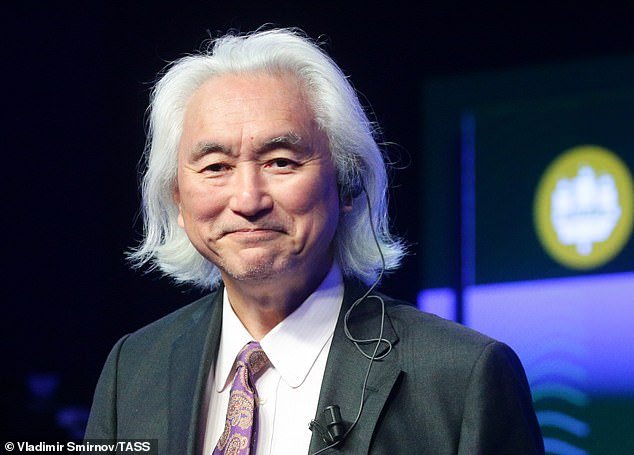Contact with alien life is just around the corner, according to leading physicist, but we shouldn’t expect it to be friendly.
String theory expert and futurist Michio Kaku believes we’ll find signs of life in the universe within the century.
But just blindly reaching out to extraterrestrials is ‘a terrible idea,’ he told The Guardian, comparing it to Montezuma meeting with Hernan Cortés before the Spanish decimated the Aztec in the 16th century.
Kaku, the author of several science best-sellers, advises making first contact ‘very carefully.’
Scroll down for video
‘I think that aliens out there would be friendly but we can’t gamble on it,’ said futurist Michio Kaku, author of The God Equation. Kaku calls blithely reaching out to extraterrestrials a ‘terrible idea’
The reference to Montezuma may spark fear among Earthlings, as the ancient ruler of the Aztecs in the 1500s who welcomed Cortés and was killed because of his good deed.
Cortés took advantage of the welcoming, took Montezuma hostage so that he could take the Aztec throne.
Montezuma is said to have later been killed by his angry subjects who believed he had willing given up to Spanish rule.
And Kaku warns that welcoming foreign beings to Earth may have the same outcome.

With the planned October launch of the James Webb Space Telescope (pictured), ‘We’ll have thousands of planets to look at,’ says Kaku, who has predicted humans will make contact with aliens within the 21st century

But just blindly reaching out to extraterrestrials is ‘a terrible idea,’ he told The Guardian , comparing it to Montezuma meeting with Cortés before the Spanish decimated the Aztec in the 16th century
Kaku is a professor of theoretical physics at City College in New York and a leading proponent of string theory.
He popularizes physics on TV and has written several New York Times best sellers, including Physics of the Future and The Future of the Mind, which postulates on the possibilities of telepathy and programmable memories.
His latest book, The God Equation, discusses the ongoing quest to develop a ‘theory of everything’ that unites the fundamental forces of nature.
But Kaku’s scientific curiosity extends into other realms, including the search for intelligent life in the universe.
In a 2018 reddit AMA, he said he felt humanity would make contact with aliens ‘within the century.’
His optimism comes from the planned October 2021 launch of the James Webb Space Telescope, which will offer even greater infrared resolution and sensitivity than the Hubble telescope.
‘We’ll have thousands of planets to look at, and that’s why I think the chances are quite high that we may make contact with an alien civilization,’ he said in a new interview with The Guardian.
But the noted futurist is ambivalent about ringing an ET’s doorbell.
‘There are some colleagues of mine that believe we should reach out to them,’ he told the Guardian. ‘I think that’s a terrible idea.’
‘We all know what happened to Montezuma when he met Cortés in Mexico so many hundreds of years ago.’
Montezuma II, the last emperor of the Aztecs, was defeated by Spanish conquistador Hernán Cortés in 1520.
‘Now, personally, I think that aliens out there would be friendly but we can’t gamble on it,’ Kaku added. ‘So I think we will make contact but we should do it very carefully.’
In our rush to communicate, he said in the reddit AMA, we also should think about their intentions: ‘Are they expansive and aggressive, or peaceful?’
And communication may not be that easy.
Because we’re using radio waves, ‘talking to them will be difficult, since they could be tens of light years away,’ he said in the AMA.

Kaku is hardly alone in having reservations about a close encounter. ‘We don’t know much about aliens, but we know about humans,’ renowned physicist Stephen Hawkings (pictured) said in 2018
‘[Another] possibility is that they land on the White House lawn and announce their existence,’ he added. ‘But I think that is unlikely, since we would be like forest animals to them.’
Kaku is hardly alone in having reservations about a close encounter.
‘We don’t know much about aliens, but we know about humans,’ renowned physicist Stephen Hawkings said in 2018, Live Science reported.
‘If you look at history, contact between humans and less intelligent organisms have often been disastrous from their point of view, and encounters between civilizations with advanced versus primitive technologies have gone badly for the less advanced.’
An alien civilization receiving a message from Earth could be ‘billions of years’ ahead of human development, he added.
‘If so, they will be vastly more powerful, and may not see us as any more valuable than we see bacteria.’
But, like Kaku, Hawkins still supported the search for alien life.
In fact his comments were given at a press event announcing a ten-year, $100 million effort to listen for broadcast signals from the million closest stars, using two of the world’s most powerful telescopes.
‘It’s time to commit to finding the answer – to search for life beyond Earth,’ he said. ‘We are alive. We are intelligent. We must know.’
